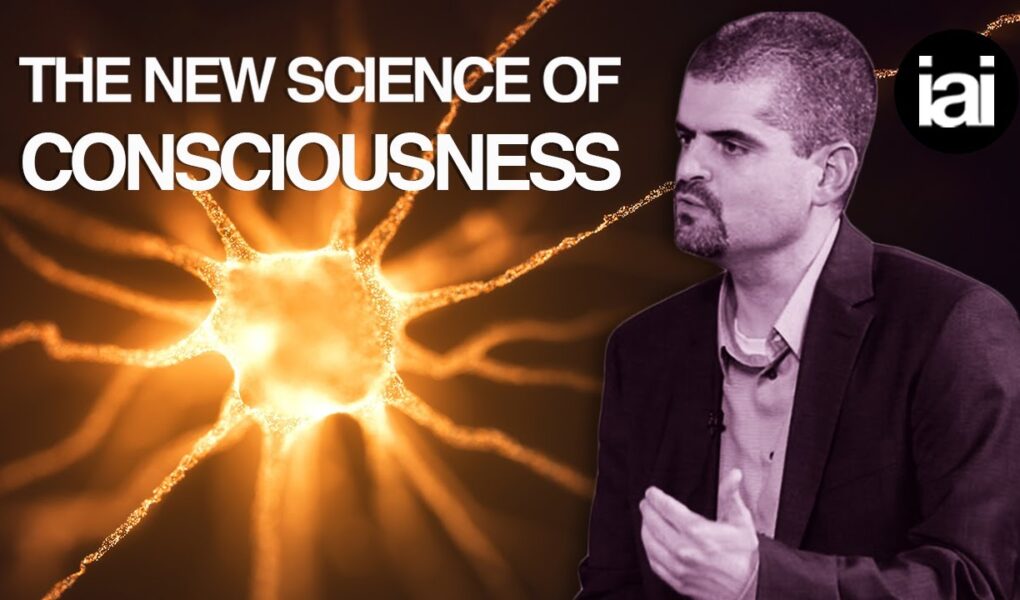The Institute of Art and Ideas
Bernardo Kastrup, Carlo Rovelli and Patricia Churchland lock horns over the New Science of Consciousness.
00:00 Intro
01:20 Patricia Churchland | On scientific evidence
02:50 Bernardo Kastrup | On material idealism
04:47 Carlo Rovelli | There is no hard problem of consciousness
07:00 Robert Lawrence Kuhn | Will we ever be able to provide data explaining consciousness?
Watch the full debate at https://iai.tv/video/the-new-science-of-consciousness?utm_source=YouTube&utm_medium=description
We are uncovering a new science of consciousness. A theory that is getting closer to solving the problem of the self once and for all. Or at least so claim leading neuroscientists. Some argue the reality we perceive is a controlled hallucination as a best guess to how the world really is. Others that quantum mechanics or multiple levels of brain organisation are responsible for consciousness. But critics maintain these don’t get to the heart of the problem: how the material stuff of the brain is responsible for the immaterial stuff of experience.
Should we see the ‘new science of consciousness’ as marketing hype? Might we alternatively need to give up our very notion of reality? Or could science be about to crack the ancient problem of the self once and for all?
#TheNewScienceOfConsciousness #IsQuantumTheKey #DataConsciousness
Legendary theoretical physicist Carlo Rovelli, ground breaking metaphysical idealist @bernardokastrup , godmother of neurophilosophy Patricia Churchland lock horns over the New Science of Consciousness.
Robert Lawrence Kuhn, @CloserToTruthTV , hosts.
To discover more talks, debates, interviews and academies with the world’s leading speakers visit https://iai.tv/subscribe?utm_source=YouTube&utm_medium=description&utm_campaign=the-new-science-of-consciousness
The Institute of Art and Ideas features videos and articles from cutting edge thinkers discussing the ideas that are shaping the world, from metaphysics to string theory, technology to democracy, aesthetics to genetics. Subscribe today!
For debates and talks: https://iai.tv
For articles: https://iai.tv/articles
For courses: https://iai.tv/iai-academy/courses
Source




Will we ever be able to provide data explaining consciousness? What do you think? To watch the full debate visit https://iai.tv/video/the-new-science-of-consciousness?utm_source=YouTube&utm_medium=pinned+comment
Can science crack the mystery of Consciousness? No and Yes. No with logic and mathematics, since these tools will only get you to the an intellectual realization that materialism is baloney and Consciousness is fundamental. However, to actually experience Consciousness "In-Itself", the ancient Buddhists and Hindus have provided methods for doing this but the mind must be transcended in the state of Samadhi/Satori. No problem. Access "Mahamritunjaya mantra – Sacred Sounds Choir" and listen to it for a few min per day for at least two weeks. Enjoy.
I am a physicist and I will explain why our scientific knowledge refutes the idea that consciousness is generated by the brain and that the origin of our mental experiences is physical/biological (in my youtube channel you can find a video with more detailed explanations). My arguments prove the existence in us of an indivisible unphysical element, which is usually called soul or spirit.
Physicalism/naturalism is based on the belief that consciousness is an emergent property of the brain, but I will discuss two arguments that prove that this hypothesis implies logical contradictions and is disproved by our scientific knowledge of the microscopic physical processes that take place in the brain. (With the word consciousness I do not refer to self-awareness, but to the property of being conscious= having a mental experiences such as sensations, emotions, thoughts, memories and even dreams).
1) All the alleged emergent properties are just simplified and approximate descriptions or subjective/arbitrary classifications of underlying physical processes or properties, which are described DIRECTLY by the fundamental laws of physics alone, without involving any emergent properties (arbitrariness/subjectivity is involved when more than one option is possible; in this case, more than one possible description). An approximate description is only an abstract idea, and no actual entity exists per se corresponding to that approximate description, simply because an actual entity is exactly what it is and not an approximation of itself. What physically exists are the underlying physical processes and not the emergent properties (=subjective classifications or approximate descriptions). This means that emergent properties do not refer to reality itself but to an arbitrary abstract concept (the approximate conceptual model of reality). Since consciousness is the precondition for the existence of concepts, approximations and arbitrariness/subjectivity, consciousness is a precondition for the existence of emergent properties.
Therefore, consciousness cannot itself be an emergent property.
The logical fallacy of materialists is that they try to explain the existence of consciousness by comparing consciousness to a concept that, if consciousness existed, a conscious mind could use to describe approximately a set of physical elements. Obviously this is a circular reasoning, since the existence of consciousness is implicitly assumed in an attempt to explain its existence.
2) An emergent property is defined as a property that is possessed by a set of elements that its individual components do not possess. The point is that the concept of set refers to something that has an intrinsically conceptual and subjective nature and implies the arbitrary choice of determining which elements are to be included in the set; what exists objectively are only the single elements (where one person sees a set of elements, another person can only see elements that are not related to each other in their individuality). In fact, when we define a set, it is like drawing an imaginary line that separates some elements from all the other elements; obviously this imaginary line does not exist physically, independently of our mind, and therefore any set is just an abstract idea, and not a physical entity and so are all its properties. Since consciousness is a precondition for the existence of subjectivity/arbitrariness and abstractions, consciousness is the precondition for the existence of any emergent property, and cannot itself be an emergent property.
Both arguments 1 and 2 are sufficient to prove that every emergent property requires a consciousness from which to be conceived. Therefore, that conceiving consciousness cannot be the emergent property itself. Conclusion: consciousness cannot be an emergent property; this is true for any property attributed to the neuron, the brain and any other system that can be broken down into smaller elements.
On a fundamental material level, there is no brain, or heart, or any higher level groups or sets, but just fundamental particles interacting. Emergence itself is just a category imposed by a mind and used to establish arbitrary classifications, so the mind can't itself be explained as an emergent phenomenon.
Obviously we must distinguish the concept of "something" from the "something" to which the concept refers. For example, the concept of consciousness is not the actual consciousness; the actual consciousness exists independently of the concept of consciousness since the actual consciousness is the precondition for the existence of the concept of consciousness itself. However, not all concepts refer to an actual entity and the question is whether a concept refers to an actual entity that can exist independently of consciousness or not. If a concept refers to "something" whose existence presupposes the existence of arbitrariness/subjectivity or is a property of an abstract object, such "something" is by its very nature abstract and cannot exist independently of a conscious mind, but it can only exist as an idea in a conscious mind. For example, consider the property of "beauty": beauty has an intrinsically subjective and conceptual nature and implies arbitrariness; therefore, beauty cannot exist independently of a conscious mind.
My arguments prove that emergent properties, as well as complexity, are of the same nature as beauty; they refer to something that is intrinsically subjective, abstract and arbitrary, which is sufficient to prove that consciousness cannot be an emergent property because consciousness is the precondition for the existence of any emergent property.
The "brain" doesn't objectively and physically exist as a single entity and the entity “brain” is only a conceptual model. We create the concept of the brain by arbitrarily "separating" it from everything else and by arbitrarily considering a bunch of quantum particles altogether as a whole; this separation is not done on the basis of the laws of physics, but using addictional arbitrary criteria, independent of the laws of physics. The property of being a brain, just like for example the property of being beautiiful, is just something you arbitrarily add in your mind to a bunch of quantum particles. Any set of elements is an arbitrary abstraction therefore any property attributed to the brain is an abstract idea that refers to another arbitrary abstract idea (the concept of brain).
Furthermore, brain processes consist of many parallel sequences of ordinary elementary physical processes. There is no direct connection between the separate points in the brain and such connections are just a conceptual model used to approximately describe sequences of many distinct physical processes; interpreting these sequences as a unitary process or connection is an arbitrary act and such connections exist only in our imagination and not in physical reality. Indeed, considering consciousness as a property of an entire sequence of elementary processes implies the arbitrary definition of the entire sequence; the entire sequence as a whole is an arbitrary abstract idea , and not to an actual physical entity.
For consciousness to be physical, first of all the brain as a whole (and brain processes as a whole) would have to physically exist, which means the laws of physics themselves would have to imply that the brain exists as a unitary entity and brain processes occur as a unitary process. However, this is false because according to the laws of physics, the brain is not a unitary entity but only an arbitrarily (and approximately) defined set of quantum particles involved in billions of parallel sequences of elementary physical processes occurring at separate points. This is sufficient to prove that consciousness is not physical since it is not reducible to the laws of physics, whereas brain processes are. According to the laws of physics, brain processes do not even have the prerequisites to be a possible cause of consciousness.
As discussed above, an emergent property is a concept that refers to an arbitrary abstract idea (the set) and not to an actual entity; this rule out the possibility that the emergent property can exist independently of consciousness. Conversely, if a concept refers to “something” whose existence does not imply the existence of arbitrariness or abstract ideas, then such “something” might exist independently of consciousness. An example of such a concept is the concept of “indivisible entity”. Contrary to emergent properties, the concept of indivisible entity refers to something that might exist independently of the concept itself and independently of our consciousness.
My arguments prove that the hypothesis that consciousness is an emergent property implies a logical fallacy and an hypothesis that contains a logical contradiction is certainly wrong.
Consciousness cannot be an emergent property whatsoever because any set of elements is a subjective abstraction; since only indivisible elements may exist objectively and independently of consciousness, consciousness can exist only as a property of an indivisible element. Furthermore, this indivisible entity must interact globally with brain processes because we know that there is a correlation between brain processes and consciousness. This indivisible entity is not physical, since according to the laws of physics, there is no physical entity with such properties; therefore this indivisible entity corresponds to what is traditionally called soul or spirit. The soul is the missing element that interprets globally the distinct elementary physical processes occurring at separate points in the brain as a unified mental experience. Marco Biagini
Why does every intellectual point their camera at their book collection?
I love that instead of typing her name into the title of the video like they do with her colleagues, IAI just refers to Patricia Churchland as “more.”
My humble feeling is that only BK knows what is the subject in discussion.
Patricia seems somewhat mentally constipated and structurally obtuse.
…it was cloudy all day,
..how would I know..
..?…??
..when did you're sun's head..
…??
..noo,
..it's a point of view…
..
..ahhh,
..to be nobody..
So many books
7:35 Question for Kastrup
To me, consciousness isnt as hard as people make it out to be.
think of a paramecium, or other single-cell organism.
They can search for food, and run away from bad things in the environment, like high or low PH.
From this point, everything can be explained from darwinistic evolution.
Most of what we think of as human consciousness, is just emotions coming from seratonin, oxytocin, dopamine and other neurotransmitters.
Memories, especially, very short-term, a second-by-second account of our reality interacting with senses account for what we "see" and experience.
So, in this respect, its "life itself" that is conscious, and yes there seems to be a barrier in our understanding here.
But, i would argue, its not as big as we think.
If you read "Nick Lane", and "Lee Cronin" (lots of YOUTUBE videos) … you will see that life can come from molecular complexity.
and that complexity itself seems to be a fundamental property of the universe.
One thing I'd like to point out in these talks is the colloquial use of the word consciousness. My understanding is that consciousness refers to introspection and meta-cognition, whereas sentience refers to the inner subjective experience. I find that people often use the word consciousness when they're actually talking about sentience.
So, all living things have sentience and an inner experience, but only certain animals (like humans) have some level of self aware consciousness.
Bernardo Kastrup is brilliant. I'm a Hyperian Idealist and everything Bernardo says falls perfectly within that line of reasoning. Reality is fundamentally mind.
😀
I'm trying to imagine a conversation between Kastrup and David Chalmers. In fact, I am going to look for a conversation between Kastrup and Chalmers.
Bernardo was asked how his theory can be falsified. He answered that the absence of situations in which brain activity and experience dissociate, would falsify his theory (note how convoluted that sounds). In other words, his theory (apparently) predicts the existence of such situations. This, however, is not a prediction, because such situations have been known to exist. This is philosophy disguised as science. Weak stuff.
Bernardo Kastrup 10 x Patricia & Roveli 0
Bernardo is a bad bad man.
Get your brains around lowering the price of heating our homes we are dying out here